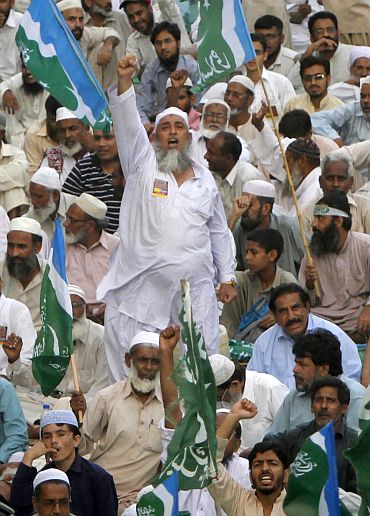
India needs to be aware of the potentially-catastrophic implications of the collapse of governing authority in Pakistan. A boost to fundamentalist forces in the neighbourhood will have some serious consequences for the utility of nuclear deterrence in the sub-continent, says Harsh V Pant
A government unable to control large parts of its territory, a military in disarray, loss of control over nuclear assets, radical Islamists intent on acquiring Weapons of Mass Destruction -- it is the stuff of nightmares.
And Pakistan's current turmoil is causing jitters around the world precisely because the nightmarish scenario evoked above might just come to pass as Pakistani security establishment's dalliance with radical Islamist groups drags the nation to the brink of collapse.
Recent days have witnessed major attacks on key Pakistani military and intelligence facilities by the Tehrik-i-Taliban Pakistan, a group that for the past several years has fought an increasingly brutal war in the heart of the Pakistani state.
....
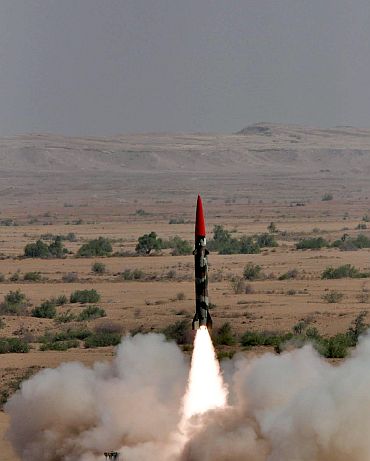
A handful of militants who attacked the Pakistani naval base PNS Mehran in Karachi on May 22 have also underlined the enormity of the security challenge that violent Islamists pose to Pakistan and the whole region.
For long, the US and the West have viewed nuclear weapons in South Asia with dread because of the possibility that a conventional war between India and Pakistan might escalate into a nuclear one.
Former US President Bill Clinton called the Kashmir conflict "the most dangerous flashpoint on earth" precisely because of this fear of a nuclear holocaust in the Indian sub-continent.
Indian and Pakistani officials, on the other hand, have continued to argue that just as the threat of Mutual Assured Destruction resulted in a "hot peace" between the US and the former Soviet Union during the Cold War, nuclear weapons in South Asia will also have a stabilising impact.
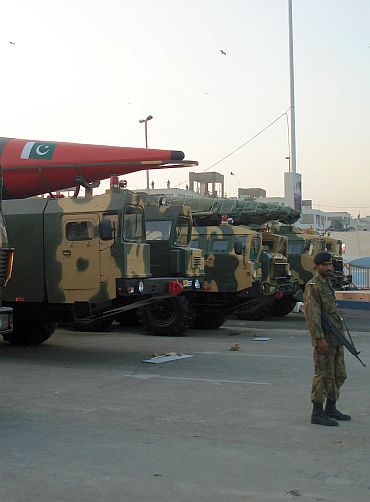
They point out the fact that despite several provocations, India and Pakistan have behaved "rationally" during various crises by keeping their conflicts limited and avoiding escalation.
But since September 11, 2001, the nature of problem for the West has changed in so far as the threat is now more of Pakistan's nuclear arsenal being used against the West by radical Islamists if they can lay their hands on it.
The present turmoil in Pakistan has once again raised concerns about the safety, security and command and control of its nuclear stockpile.
Though Pakistan's government continues to dismiss media reports that its nuclear weapons were in danger of falling into the "wrong hands" as "inspired," and stressed that Pakistan provided the highest level of institutionalised protection to its strategic assets, the credibility of such claims remains open to question.
Instituted in 2000, Pakistan's nuclear command and control arrangements are centered on the National Command Authority, which comprises the Employment Control Committee, the Development Control Committee and the Strategic Plans Division.
Only a small group of military officials apparently have access to the country's nuclear assets. However, these command and control arrangements continue to be beset with some fundamental vulnerabilities that underline the reluctance of the Pakistani military to cede control over the nation's nuclear assets to civilian leaders.
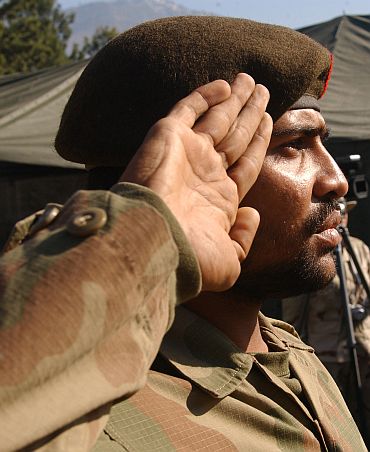
It is instructive to note that of all the major nuclear states in world, Pakistan is the only country where the nuclear button is in the hands of the military. Moreover, senior civilian and military officials responsible for these weapons have a problematic track-record in maintaining close control over them.
A Q Khan was the head of the Pakistani nuclear programme (and a veritable national hero) but was instrumental in making Pakistan the centre of the biggest nuclear proliferation network by leaking technology to states far and wide including Iran, North Korea and Libya.
Pakistani nuclear scientists have even travelled to Afghanistan at the behest of Osama bin Laden.
While its is true that the Pakistani military remains very professional and perhaps the only the cohesive force in the country today, it has also become deeply demoralised, reflected in the large number of soldiers preferring to surrender to the militants rather than fight.
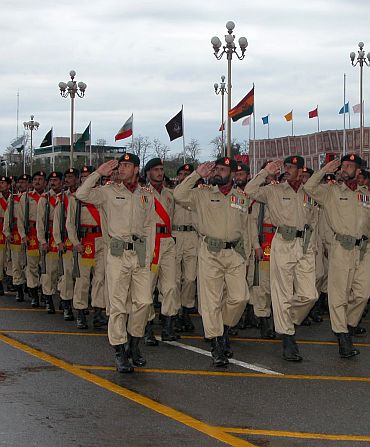
There are growing signs of fraying loyalties in the Pakistani Army, underlining the danger to its cohesiveness.
The growing "Islamisation" of the younger generation of Pakistani military officers is well-recorded.
Given the close links between the Pakistani military and intelligence services and the militant groups fighting in Kashmir and the Taliban, it is not far-fetched to assume that there is a real danger of elements within Pakistan's military-intelligence complex colluding with radical Islamist groups.
Pakistan has accepted US help since 9/11 in designing its system of controls for its nuclear arsenal and the prevention of theft. The US has reportedly spent about $100 million in helping Pakistan secure its nuclear arsenal, and some reports have suggested that Pakistan has also received technical assistance from the US.
Throughout the Cold War years, it was viewed as politically prudent in the West and especially in the US to ignore Pakistan's drive towards nuclear acquisition, as Pakistan was seen as an important ally of the west in countering the Soviet Union in Afghanistan and elsewhere.
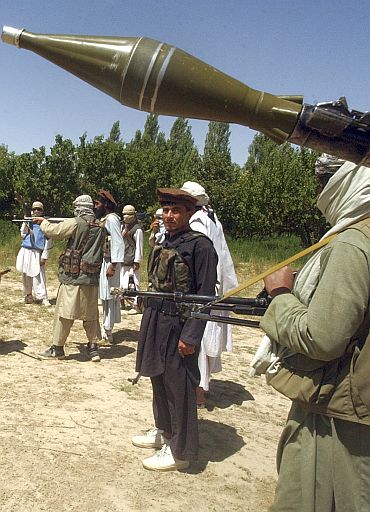
Nuclear proliferation has never been a first order priority for the US when it comes to Pakistan. Now the chickens are coming home to roost as the Pakistani military seems unable and unwilling to take on the Islamist forces gathering momentum on Pakistani territory on the one hand; while on the other, the nation's nuclear weapons seem within reach of the extremist forces.
The US has suggested that there are contingency plans in place to deal with the possibility of Pakistan's nuclear weapons falling into the hands of militant groups, but it remains far from clear as to what exactly the US would be able to do if such an eventuality arose.
Meanwhile, India needs to be aware of the potentially catastrophic implications of the collapse of governing authority in Pakistan. A boost to fundamentalist forces in India's neighbourhood will have some serious consequences for the utility of nuclear deterrence in the sub-continent.
Irrespective of India's other problems with Pakistan, Indian decision-makers had little doubt so far in trusting that their Pakistani counterparts would take rational decisions in so far as the use of nuclear weapons was concerned. That assumption might soon need revisiting if the present trends in Pakistan continue for much longer.
The present turmoil in Pakistan and all its attendant consequences in the nuclear realm point to the long-term costs of short-sighted policies -- the politics of proliferation -- followed by the West in countering proliferation.
Harsh V Pant teaches at King's College, London